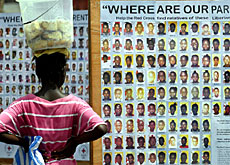ICTs save lives by speeding up aid delivery

The delivery of humanitarian aid to the victims of disaster and conflict is becoming faster and more efficient, thanks to Information and Communication Technologies (ICTs).
According to humanitarian officials in Geneva, the internet, databases and computer networks are also increasingly helping to take the paperwork out of relief work.
From registering prisoners of war to getting food and water to earthquake victims, ICTs have made it easier in recent years to keep track of both people and supplies during times of conflict and disaster.
They have also improved communication with relief workers in remote areas, allowing for a faster and more accurate assessment of the situation on the ground.
“When I started at the ICRC, we had very primitive modes of communication in the field,” a spokeswoman for the International Committee of the Red Cross (ICRC), Antonella Notari, told swissinfo.
Essential tool
But today, that’s just not possible because we have to be able to communicate and transmit information to a whole network of people in the ICRC and in other organisations,” she added.
Erik Davies, of the United Nations Development Programme, agrees that ICTs are increasingly becoming an essential tool in humanitarian and development work.
“Our role as facilitators for development depends heavily on our use of ICTs and our ability to provide expert advice from one country to another,” said Davies. “We simply couldn’t work without ICTs… It’s just unimaginable.”
The improved sharing of relief data between humanitarian agencies is a concept that the International Federation of Red Cross and Red Crescent Societies is keen to develop in the future.
Keeping track
The Federation, which focuses mainly on disaster preparedness and management, along with improving health care, recently began using a humanitarian logistics software package that is expected to speed up the organisation’s relief work by 20 to 30 per cent.
Developed in conjunction with the Fritz Institute in the United States city of San Francisco, the web-based platform has been customised to allow up-to-the minute tracking of the availability and delivery of goods, such as food, water and blankets.
“The software is based on needs assessment during the emergency phase of a disaster and we expect it to have a big impact on our supply chain control, because everyone will have on-line and on-time access to the same database,” the head of logistics for the Federation, Bernard Chomilier, told swissinfo.
“The objective is to continue developing this type of management software for the Federation and other organisations maybe in the future,” he added.
Missing persons
Like the Federation, the ICRC – which works to protect the victims of conflict – also employs a sophisticated database system to help locate missing and displaced persons in post-war situations.
“In tracing a request from the family of someone who has disappeared, we will log a physical description of that person into our database,” said Notari.
So, if we come across a body in a mass or individual grave that matches that description, we heighten the possibility of identifying the body and giving it back to the family for a decent burial,” she added.
Similarly, when ICRC delegates visit prisoners of war, they take down detailed personal and detention histories of the PoWs, which are later entered into a general database.
“ICTs have enormously facilitated the registering and management of data on prisoners,” said Notari. “The database allows us to follow a person throughout their detention and to inform families, who may not know their relatives have been imprisoned.”
The ICRC also uses databases to record data on land mines and to track the war wounded in surgical hospitals.
swissinfo, Anna Nelson in Geneva
The International Committee of the Red Cross (ICRC) works to protect the victims of conflict and promote humanitarian law.
The International Federation of Red Cross and Red Crescent Societies (IFRC) is the world’s largest humanitarian organisation and aims to provide assistance to victims of disaster and improve health and community care.
Both organisations are based in Geneva and often work together, along with United Nations agencies and other aid groups, to help the victims of conflict and disaster.
Development and humanitarian officials say Information and Communication Technologies (ICTs) are growing increasingly important in their work.

In compliance with the JTI standards
More: SWI swissinfo.ch certified by the Journalism Trust Initiative
You can find an overview of ongoing debates with our journalists here. Please join us!
If you want to start a conversation about a topic raised in this article or want to report factual errors, email us at english@swissinfo.ch.